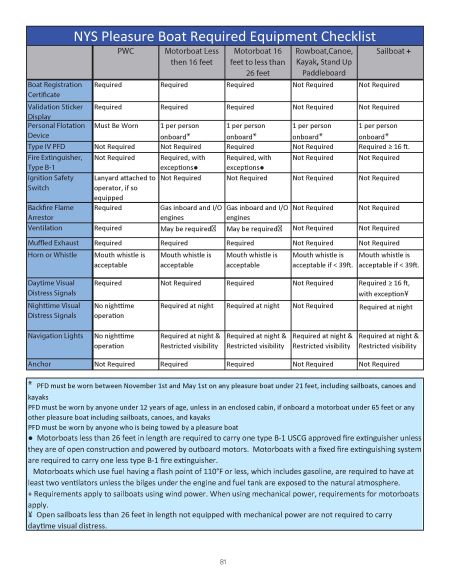Boating

New York’s abundance of beautiful waterways serves as the perfect setting for boating of all kinds. Sparkling lakes, historic canals, thriving rivers, and the vast Atlantic welcome boaters, sailors, and paddlers for sun-soaked memories. Spending more time on the water is easier with marinas, docks, launches, and outfitters in the state’s coastal communities and shorefront destinations geared toward water-based recreation.
- NY State Parks operated boat launches and slips
- NY State and municipal launch sites by county
- I LOVE NY
 is another resource for marinas, launches, fishing, and outfitters.
is another resource for marinas, launches, fishing, and outfitters.
Know Before You Go
The following information includes education, requirements, best practices, and other important resources for a safe and enjoyable outing on the water every time. Communicating with your passengers is key. Explain your rules to passengers before permitting them to board your boat. Show them where you keep your safety gear and make sure they understand how to use it before you cast off. Find out if any of your passengers have any knowledge of first aid procedures. Well-informed and well-behaved passengers help ensure a safe voyage for all aboard and others enjoying the same waterway.
Safe Boating Courses
Brianna’s Law mandates that all operators of motorized vessels, including personal watercraft (PWCs) (JetSki™, Wave Runner™, etc.) and specialty craft must complete a state-approved safe boating course. While operators of non-motorized boats, such as kayaks and canoes, are not required to take the course at this time, it is strongly encouraged.
Highlights:
- You must be at least 10 years of age to take the course
- Safe Boating Certificates are valid for life, but you must have the original, physical certificate on your person or on board while operating a motorized boat.
- New York recognizes the Safe Boating Certificate issued by your home state.
- Individuals over 18 years of age may rent and operate a motorboat from a livery (boat rental, outfitter) without obtaining a boating safety certificate. Livery staff must provide basic instruction and safety information before you depart the dock.
- Individuals under 18 may rent and operate a motorboat but must have a safe boating certificate.
- Courses are available in person and online so that you can choose the course that best fits your needs.
Personal Flotation Devices
Whether you are operating a motorized or non-motorized vessel, personal watercraft (PWC), specialty craft, sailboat, kayak, canoe, or paddleboard, you are required to have one life jacket for each person on board.
Lifejackets must be:
- US Coast Guard approved
- Easily reached in an emergency (readily accessible)
- Free of fading, rips, or tears
- The proper size for the intended wearer How to choose the right life jacket
 .
.
Required Safety Equipment
Please see the chart below for the equipment requirements specific to your vessel.

For more information about these types of safety equipment, visit NY State Boating Student textbook
Clean, Drain, Dry
New York State law requires that all boats (including motorboats, PWCs, kayaks/canoes, and associated equipment) operated anywhere in the state be clean, drain, dry or treated before launching into a public waterbody. This requirement can be met by the boat operator OR by visiting a watercraft inspection station. At select locations, watercraft inspection stewards can assist with watercraft and gear inspections and direct boaters to a decontamination station if aquatic invasive species are found or suspected.
Help protect NY’s waterways by stopping the spread of aquatic invasive species.
Clean, Drain, Dry Instruction
Find a boat decontamination station
Float Plan
Before your outing, create a float plan to leave with a reliable and trusted person ashore. A float plan can be as simple as a text message or a more complex plan for extended trips.
Float Plan template
In your float plan, include:
- description of boat, vessel information,
- names and phone numbers of passengers,
- where you are planning to go,
- when and where you plan to depart and return, and
- who to contact in an emergency. Be sure your emergency contact knows where to find the details of your float plan
Boating Accidents and Reporting
Most accidents can be prevented by following good boating safety practices, but if you are involved in a boating accident, you are required to report it to New York State Parks within 5 days if the accident resulted in:
- An injury that required medical care beyond basic first aid
- Death or disappearance of a person
- Damage to any one party in excess of $1,000
- Recreational Boating Accident form
Recreational Boating Report and Boaters Guide
The Recreational Boating Report is prepared annually to provide insight into why accidents occur and possible measures to prevent them. For prior year reports, please contact us, and we will provide them.
New York State Boaters Guide
- New York Boaters Guide, English

- New York Boaters Guide, Spanish

- Request a hard copy by mail
 of the New York Boaters guide.
of the New York Boaters guide.
Contact Us
Marine Services Bureau
518-474-0445
For general boating or boating safety certificate questions: boating@parks.ny.gov
For questions about Public Vessel (commercial) licensing or inspections: NYSPublicVessels@parks.ny.gov

